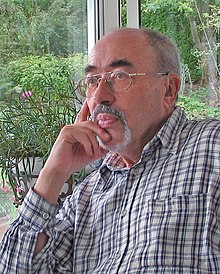H. Dieter Zeh | |
|---|---|
 | |
| Born | 8 May 1932 |
| Died | 15 April 2018 (aged 85) |
| Nationality | German |
| Education |
Technical University of Braunschweig University of Heidelberg |
| Known for |
Many-minds interpretation Quantum decoherence |
| Scientific career | |
| Fields | Theoretical physics |
| Institutions | University of Heidelberg |
| Thesis | Untersuchungen zur Theorie des -Zerfalls (1961) |
| Doctoral advisor | Hans-Jörg Mang |
Heinz-Dieter Zeh (German: [tseː]; 8 May 1932 – 15 April 2018), usually referred to as H. Dieter Zeh, was a professor (later professor emeritus) of the University of Heidelberg and theoretical physicist. [1]
Education and career
Zeh was born in Braunschweig and studied physics at the Technical University of Braunschweig and nuclear physics at the University of Heidelberg under J. Hans D. Jensen. At Heidelberg, he also investigated alpha particle formation in nuclei with Hans-Jörg Mang and Zeh investigated the topic for his PhD thesis under Mang. Between 1964 and 1965, Zeh was a research assistant at California Institute of Technology and in 1965 and between 1967 and 1968 at the University of California, San Diego. He later became a professor in Heidelberg. [1] [2]
Research
Zeh's research revolves around the fundamental problems of quantum mechanics since the 1960s, in particular with Hugh Everett III's many-worlds interpretation. Zeh was one of the developers of the many-minds interpretation of quantum mechanics [3] and the discoverer of decoherence, first described in his seminal 1970 paper. [4]
Bibliography
- The Problem Of Conscious Observation In Quantum Mechanical Description (June, 2000).
- The Physical Basis of the Direction of Time, 2001, ISBN 3-540-42081-9
- Decoherence and the Appearance of a Classical World in Quantum Theory, 2003, ISBN 3-540-00390-8 (with Erich Joos, Claus Kiefer, Domenico Giulini, Joachim Kupsch, Ion-Olimpiu Stamatescu)
- "On the interpretation of measurement in quantum theory", 1970, Foundations of Physics, Volume 1, Issue 1, pp. 69–76
See also
References
- ^ a b Päs, Heinrich (2018-05-16). "Der Alte Mann und das Multiversum - Ein Nachruf auf H. Dieter Zeh". Das Zauberwort (in German). Retrieved 2023-09-10.
- ^ Kiefer, Claus (2018-12-29). "OBITUARY FOR HEINZ-DIETER ZEH (1932 — 2018)". International Journal of Quantum Foundations. Retrieved 2023-09-10.
- ^ Lockwood, Michael (1996). "'Many Minds'. Interpretations of Quantum Mechanics". The British Journal for the Philosophy of Science. 47 (2): 159–188. ISSN 0007-0882.
- ^ Zeh, H. D. (1970). "On the interpretation of measurement in quantum theory". Foundations of Physics. 1 (1): 69–76. doi: 10.1007/BF00708656. ISSN 0015-9018.
External links
- 1932 births
- 2018 deaths
- 20th-century German physicists
- Quantum physicists
- Science teachers
- German science writers
- Scientists from Braunschweig
- German theoretical physicists
- German male non-fiction writers
- Academic staff of Heidelberg University
- Heidelberg University alumni
- Technical University of Braunschweig alumni
- German physicist stubs
H. Dieter Zeh | |
|---|---|
 | |
| Born | 8 May 1932 |
| Died | 15 April 2018 (aged 85) |
| Nationality | German |
| Education |
Technical University of Braunschweig University of Heidelberg |
| Known for |
Many-minds interpretation Quantum decoherence |
| Scientific career | |
| Fields | Theoretical physics |
| Institutions | University of Heidelberg |
| Thesis | Untersuchungen zur Theorie des -Zerfalls (1961) |
| Doctoral advisor | Hans-Jörg Mang |
Heinz-Dieter Zeh (German: [tseː]; 8 May 1932 – 15 April 2018), usually referred to as H. Dieter Zeh, was a professor (later professor emeritus) of the University of Heidelberg and theoretical physicist. [1]
Education and career
Zeh was born in Braunschweig and studied physics at the Technical University of Braunschweig and nuclear physics at the University of Heidelberg under J. Hans D. Jensen. At Heidelberg, he also investigated alpha particle formation in nuclei with Hans-Jörg Mang and Zeh investigated the topic for his PhD thesis under Mang. Between 1964 and 1965, Zeh was a research assistant at California Institute of Technology and in 1965 and between 1967 and 1968 at the University of California, San Diego. He later became a professor in Heidelberg. [1] [2]
Research
Zeh's research revolves around the fundamental problems of quantum mechanics since the 1960s, in particular with Hugh Everett III's many-worlds interpretation. Zeh was one of the developers of the many-minds interpretation of quantum mechanics [3] and the discoverer of decoherence, first described in his seminal 1970 paper. [4]
Bibliography
- The Problem Of Conscious Observation In Quantum Mechanical Description (June, 2000).
- The Physical Basis of the Direction of Time, 2001, ISBN 3-540-42081-9
- Decoherence and the Appearance of a Classical World in Quantum Theory, 2003, ISBN 3-540-00390-8 (with Erich Joos, Claus Kiefer, Domenico Giulini, Joachim Kupsch, Ion-Olimpiu Stamatescu)
- "On the interpretation of measurement in quantum theory", 1970, Foundations of Physics, Volume 1, Issue 1, pp. 69–76
See also
References
- ^ a b Päs, Heinrich (2018-05-16). "Der Alte Mann und das Multiversum - Ein Nachruf auf H. Dieter Zeh". Das Zauberwort (in German). Retrieved 2023-09-10.
- ^ Kiefer, Claus (2018-12-29). "OBITUARY FOR HEINZ-DIETER ZEH (1932 — 2018)". International Journal of Quantum Foundations. Retrieved 2023-09-10.
- ^ Lockwood, Michael (1996). "'Many Minds'. Interpretations of Quantum Mechanics". The British Journal for the Philosophy of Science. 47 (2): 159–188. ISSN 0007-0882.
- ^ Zeh, H. D. (1970). "On the interpretation of measurement in quantum theory". Foundations of Physics. 1 (1): 69–76. doi: 10.1007/BF00708656. ISSN 0015-9018.
External links
- 1932 births
- 2018 deaths
- 20th-century German physicists
- Quantum physicists
- Science teachers
- German science writers
- Scientists from Braunschweig
- German theoretical physicists
- German male non-fiction writers
- Academic staff of Heidelberg University
- Heidelberg University alumni
- Technical University of Braunschweig alumni
- German physicist stubs
